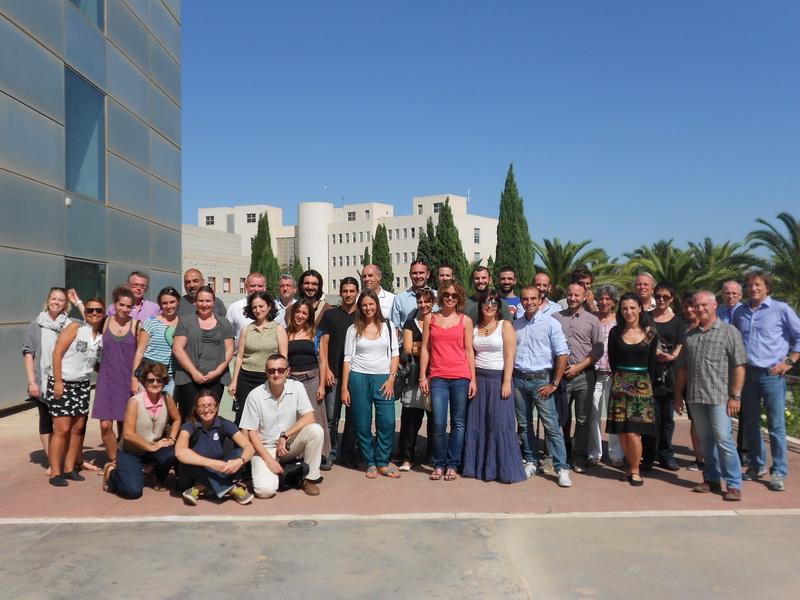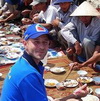|
2nd
Training Event
THE SOCIAL, ECONOMIC AND INSTITUTIONAL PERSPECTIVES IN THE CO-MANAGEMENT OF
MPAs
22
September - 3 October 2013 Murcia,
Spain
The event was designed for both MMMPA and external participants, including MSc and PhD students, MPA managers and technicians, practitioners, researchers.

Scope of the training event
The Initial Training Network for Monitoring Mediterranean Marine Protected Areas
(MMMPA) aims to train the next generation of MPA scientists and managers, equipping them with a flexible set of skills essential within a wide range of professional environments, including public administration, local authorities, industry and academia.
During the 2nd training event, socio-economic aspects of MPAs management that generally require specific competence to be solved will be illustrated by MPA managers. A practical GIS course will be also organized to guarantee the correct employment and exploitation of data. The participation of stakeholders is envisaged. Because the management of MPAs is based on scientific inputs, but must take socio-economic and conflicting demands into account, this will be a pivotal moment during the MMMPA lifetime. ESRs/ERs will face the end-users of their data, thus learning what these are needed for, how they are actually understood and used, what is in facts demanded from the managerial side and so on. Besides, aspects concerning the assessment of environmental impacts will be dealt with by researchers from the private sector. At the end of the course the students will plan a two-day retreat where they will present and discuss their research. This will be the moment where careful consideration of the work done will be undertaken and retuned, if needed, to fit MPAs´ managing requests. By the end of the retreat, ESRs/ERs will be requested to provide draft managing guidelines built i) on the basis of their own research; ii) on the basis of the bi-directional dialogue carried out with MPAs managers and stakeholders at the beginning of the training event. These will be the core of their own final deliverables, and of the MMMPA network as well. A complementing session dedicated to the implementation of soft skills is also planned (Soft skills session 2). Specific training sessions will include:
Socio-economy of MPAs (POR-MPA; TAV-MPA; MEDIN; CRO-MPA; MES-MPA; CABMPA; EES). Topics will include: Sustainable tourism; Fisheries; Upland management for water quality; Engineering of marine structures, and impacts; Ports and shipping, and impacts; Climate change.
GIS Course (MEDIN; UBICA). An introduction to Geographic Information Systems (GIS), stressing the practical applications of popular graphical user interface (GUI) software packages such as ArcView.
Personal development and soft skill training / Complementary skills
(GAIA). Session 2. Communication and outreach: science communication as an opportunity; audiences, targets and tools; networking; outreach and my career; scientific writing proper; talking science. At the end of this session of soft skills training, the ERSs/ERs will agree on a joint product they will release by the end of the third year (month 36). This product (D7.4) will target the general audience communicating the main findings of the ITN.
_resize.JPG)
Organization
commitee
José
Antonio García Charton
Departamento
de Ecología e Hidrología
Universidad de Murcia
Campus de Espinardo, 30100 Murcia (España)
Maria
Semitiel García
Departamento
de Economía Aplicada
Universidad de Murcia
Campus de Espinardo, 30100 Murcia (España)
Pedro
Noguera Méndez
Departamento
de Economía Aplicada
Universidad de Murcia
Campus de Espinardo, 30100 Murcia (España)

Program
|
Day
|
Date
|
Time
|
Activity
|
Instructors
|
|
1
|
22 Sep.
Sunday
|
All day
|
Arrival of participants
|
|
2
|
23 Sep.
Monday
|
9:30-11:00
|
MMMPA-ITN The project
|
C. Cerrano
M. Milanese
J.A. García-Charton
|
|
11:00-13:30
|
Socio-ecological systems: community-based management
|
Sergio Villamayor
|
|
15:30-17:30
|
Socio-ecological systems: community-based management
|
Sergio Villamayor
|
|
17:30-19:30
|
Soft skills
|
M. Milanese
|
|
3
|
24 Sep.
Tuesday
|
09:30-13:30
|
MPA governance analysis empirical framework
|
P. Jones
|
|
15:30-17:30
|
MPA governance analysis empirical framework
|
P. Jones
|
|
17:30-19:30
|
GIS course
|
M. Randone
|
|
4
|
25 Sep.
Wednesday
|
09:30-13:30
|
MPA governance analysis empirical framework
|
P. Jones
|
|
15:30-17:30
|
MPA governance analysis empirical framework
|
P. Jones
|
|
17:30-19:30
|
GIS course
|
M. Randone
|
|
5
|
26 Sep.
Thursday
|
09:30-13:30
|
Legal aspects of MPAs
|
B. Queffelec
|
|
15:30-17:30
|
Legal aspects of MPAs
|
B. Queffelec
|
|
17:30-19:30
|
Workshop on
indicators with MMMPA researchers:
Presentaiton:
Marcello Sano - Overview
Presentation:
Vasiliki Markantonatou - Indicators for Management
Discussion: what are
the indicators from your WP and how relevant are they for MPA
management?
Homework: online
Google Spreadsheet/Survey to collect indicators
Synthesis informing
research paper
|
|
6
|
27 Sep.
Friday
|
09:30-14:00
|
Management of Mediterranean MPAs
|
MPA managers
|
|
16:00-19:30
|
Visit to Cartagena: Fish market, meeting with the chief of Cofradía (Patrón
mayor de la cofradía de Pescadores)
|
J.A. García-Charton
|
|
19:30
|
Journey to Cabo de Palos
|
|
7
|
28 Sep.
Saturday
|
09:00-12:00
|
Diving in the Cabo de Palos Marine Reserve.
|
|
12:00-14:00
|
Visit to the Cabo de Palos Marine Reserve
|
Reserve manager
|
|
16:00-18:30
|
Working time
|
|
19:00-20:30
|
Conference (open to the general public)
|
J.A. García-Charton
|
|
8
|
29 Sep.
Sunday
|
09:30-12:00
|
Soft skills
|
M. Milanese
|
|
12:00-19:30
|
|
Diving and free timeReturn to Murcia
|
|
9
|
30 Sep.
Monday
|
09:30-13:30
|
The ecosystem
approach. Fisheries and marine management and governance
|
C. Fitzsimmons
|
|
15:30-17:30
|
The ecosystem
approach. Fisheries and marine management and governance
|
C. Fitzsimmons
|
|
17:30-19:30
|
(fellows): individual working time to integrate individual research
plans...
(partners): preparation for the Mid term Review / Management
meeting (assessment of progress)
|
|
|
10
|
1 Oct.
Tuesday
|
9:30-13:30
|
The ecosystem
approach. Fisheries and marine management and governance
|
C. Fitzsimmons
|
|
15:30-17:30
|
Preparation of Mid Term review – Presentations by each fellows
|
|
17:30-18:30
|
Preparation for the Mid term Review – fixing final issues
|
|
18:30-19:30
|
Wrapping up: Assessment of TE2, overview of foreseen steps in MMMPA
|
|
11
|
2 Oct.
Wednesday
|
9:30-19:30
|
 Mid Term Review (Detailed
agenda in PDF) Mid Term Review (Detailed
agenda in PDF)
|
C. Cerrano
|
|
12
|
3 Oct.
Thursday
|
All day
|
Departures
|
|

_resize.JPG)
Lecturers
 Peter Jones
specialises in inter-disciplinary research on different approaches to governing human uses of marine ecosystems. He is internationally recognised as an authority on marine protected area and marine spatial planning governance issues, with a particular focus on how state, market and participative approaches can be combined to achieve strategic conservation objectives. He has been an advisor to the European Common Fisheries Policy and England's conservation agency on marine protected area governance and recently undertook a project for the United Nations Environment Programme to analyse how different approaches can be combined to effectively govern marine protected areas, based on 20 case studies around the world (www.mpag.info). He is also leading a work programme on governance as part of a project on the monitoring and evaluation of spatially managed marine areas (www.mesma.org) to support the development and implementation of marine spatial planning in Europe's seas. Peter was recently appointed to the Committee for the Sussex Inshore Fisheries and Conservation Authority which has given him the interesting opportunity to apply his research knowledge to actual day-to-day management of the coastal seas near his home, including several existing and proposed MPAs. See http://www.geog.ucl.ac.uk/~pjones for contact details and more information. Peter Jones
specialises in inter-disciplinary research on different approaches to governing human uses of marine ecosystems. He is internationally recognised as an authority on marine protected area and marine spatial planning governance issues, with a particular focus on how state, market and participative approaches can be combined to achieve strategic conservation objectives. He has been an advisor to the European Common Fisheries Policy and England's conservation agency on marine protected area governance and recently undertook a project for the United Nations Environment Programme to analyse how different approaches can be combined to effectively govern marine protected areas, based on 20 case studies around the world (www.mpag.info). He is also leading a work programme on governance as part of a project on the monitoring and evaluation of spatially managed marine areas (www.mesma.org) to support the development and implementation of marine spatial planning in Europe's seas. Peter was recently appointed to the Committee for the Sussex Inshore Fisheries and Conservation Authority which has given him the interesting opportunity to apply his research knowledge to actual day-to-day management of the coastal seas near his home, including several existing and proposed MPAs. See http://www.geog.ucl.ac.uk/~pjones for contact details and more information.
 Sergio Villamayor-Tomas is research Associate and lecturer at the Division of Resource Economics, Department of Agricultural Economics, Humboldt University, Berlin. He obtained his PhD in Public Policy and Management (School of Public and Environmental Affairs and Workshop in Political Theory and Policy Anaysis, Indiana University) under the supervision of Elinor Ostrom and William Blomquist. Previous to his PhD program he obtained a Master in Public Affairs in the same school and a Master of Science in Public Policy at the National School of Political Science, Paris. Sergio Villamayor-Tomas is research Associate and lecturer at the Division of Resource Economics, Department of Agricultural Economics, Humboldt University, Berlin. He obtained his PhD in Public Policy and Management (School of Public and Environmental Affairs and Workshop in Political Theory and Policy Anaysis, Indiana University) under the supervision of Elinor Ostrom and William Blomquist. Previous to his PhD program he obtained a Master in Public Affairs in the same school and a Master of Science in Public Policy at the National School of Political Science, Paris.
Sergio's research has focused on understanding robustness to droughts and other disturbances in Spanish irrigation communities through the lenses of Common Pool Resource theory. He has also worked on applying the Social-Ecological Systems framework developed by Elinor Ostrom and colleagues to the irrigation management sector. In the near future he will be conducting field work to replicate his research on robustness in Mexican irrigation communities. He will also be co-leading a project to explore the usability of the SES approach to understand sustainability in large fresh water systems.
 Clare Fitzsimmons's background in environmental research, coupled with commercial experience gained in defence and marine consultancy sectors has given her a wide array of interests, unique analytical skills and familiarity with novel techniques not formerly applied to marine environmental issues. Although her expertise developed across several fields, a common theme is the analysis of complex systems. She now applies this to marine management and governance, primarily investigating human interactions with ecological systems. Clare Fitzsimmons's background in environmental research, coupled with commercial experience gained in defence and marine consultancy sectors has given her a wide array of interests, unique analytical skills and familiarity with novel techniques not formerly applied to marine environmental issues. Although her expertise developed across several fields, a common theme is the analysis of complex systems. She now applies this to marine management and governance, primarily investigating human interactions with ecological systems.
Interested in the ways in which human activities and their organisation impact upon the marine environment; she focuses on understanding governance systems to support decision making for natural resource management, and associated values and trade-offs made at multiple scales. Current research is developing novel social network analysis and futures techniques to explore marine resource management and governance through large-scale regional work across the Caribbean (EC FP7; Defra). She also sustains a successful local ecological programme. This aims to provide management relevant research to support the new inshore conservation obligations of local Inshore Fisheries and Conservation Authorities (IFCAs) and centres on high value local crustacea stocks, associated habitats and fishing behaviour. It attracts multiple funders (NERC, Cefas, Natural England, NIFCA, the Marine Management Organisation).
 Betty Queffelec is a public law lecturer at Brest University. She is situated in the field of integrated marine and coastal zone management (ICZM and Maritime Spatial Planning) and biodiversity. After a Master in Law of the Sea, she has become Doctor in Law. Her PhD was about the concept of Biological Diversity in international law. She was in charge of the legal analysis for the French team in COREPOINT project including an analysis of the ICZM notion and in IMCORE project aiming at developing Innovative Management for Europe's Changing Coastal Resource. She has analysed the integration of climate change concerns in local public policy on the coastal zone (especially the Morbihan Gulf case study) and has strongly contributed to the development of TAGAZAN database gathering case studies concerning coastal risk management linked to climate change. Then, she moved to the Maritime Institute in Ghent (Belgium), in the framework of a Marie Curie Post-doctorat to develop a research on Maritime Spatial Planning in the French / Belgian transboundary context. She is now conducting researches about marine environmental law at Brest University. Betty Queffelec is a public law lecturer at Brest University. She is situated in the field of integrated marine and coastal zone management (ICZM and Maritime Spatial Planning) and biodiversity. After a Master in Law of the Sea, she has become Doctor in Law. Her PhD was about the concept of Biological Diversity in international law. She was in charge of the legal analysis for the French team in COREPOINT project including an analysis of the ICZM notion and in IMCORE project aiming at developing Innovative Management for Europe's Changing Coastal Resource. She has analysed the integration of climate change concerns in local public policy on the coastal zone (especially the Morbihan Gulf case study) and has strongly contributed to the development of TAGAZAN database gathering case studies concerning coastal risk management linked to climate change. Then, she moved to the Maritime Institute in Ghent (Belgium), in the framework of a Marie Curie Post-doctorat to develop a research on Maritime Spatial Planning in the French / Belgian transboundary context. She is now conducting researches about marine environmental law at Brest University.
 Mauro
Randone is an independent ICZM and natural resource management consultant. His education includes an IB/UWC Bilingual Diploma, a Degree in Marine and Freshwater Biology (2001) and an MSc in Environmental Technology (2002) from the University of London. He was selected as a UN fellow for FAO (Vietnam) from 2006 to 2007 where he worked as a Natural Resource Unit Coordinator for the Integrated Management of Lagoon Activities (IMOLA) Project. He has been involved in several international ICZM and natural resource management projects in Uganda, Algeria, Vietnam, Iraq and Kazakhstan. He has matured over 10 years theoretical and practical GIS experience, particularly on the application of GIS in ICZM. He's currently collaborating with Med Ingegneria S.r.l. as a Deputy Project Coordinator for the "Master Plan for Sustainable Development of the Caspian Coastal Zone of Kazakhstan". Since 2013 he also collaborates with Studio Associato 3E's and with the International Institute for Cooperation and Development (NGO). Mauro
Randone is an independent ICZM and natural resource management consultant. His education includes an IB/UWC Bilingual Diploma, a Degree in Marine and Freshwater Biology (2001) and an MSc in Environmental Technology (2002) from the University of London. He was selected as a UN fellow for FAO (Vietnam) from 2006 to 2007 where he worked as a Natural Resource Unit Coordinator for the Integrated Management of Lagoon Activities (IMOLA) Project. He has been involved in several international ICZM and natural resource management projects in Uganda, Algeria, Vietnam, Iraq and Kazakhstan. He has matured over 10 years theoretical and practical GIS experience, particularly on the application of GIS in ICZM. He's currently collaborating with Med Ingegneria S.r.l. as a Deputy Project Coordinator for the "Master Plan for Sustainable Development of the Caspian Coastal Zone of Kazakhstan". Since 2013 he also collaborates with Studio Associato 3E's and with the International Institute for Cooperation and Development (NGO).
 Martina
Milanese, Degree in Biology (2000), PhD in Environmental Marine Sciences (2004). In charge of project management and field activity supervision for Studio Associato Gaia snc (GAIA), involved in national and international research projects since 2000 including FP6 INTERMED and FP7 4SEAS, SPECIAL and MMMPA. Several scientific papers related to marine biology, ecology and ecosystem services. A diver since 1993, PADI Master Scuba Diver Trainer since 2004, full boat license in 1997. Experienced as a professional diving instructor, dive guide, u/w videographer and environmental awareness promoter. Long standing experience in scientific u/w and field operations. Participation in the design and preparation of dissemination/outreach material (books, videos, CD-ROM and texts within diving journals) and events. Martina
Milanese, Degree in Biology (2000), PhD in Environmental Marine Sciences (2004). In charge of project management and field activity supervision for Studio Associato Gaia snc (GAIA), involved in national and international research projects since 2000 including FP6 INTERMED and FP7 4SEAS, SPECIAL and MMMPA. Several scientific papers related to marine biology, ecology and ecosystem services. A diver since 1993, PADI Master Scuba Diver Trainer since 2004, full boat license in 1997. Experienced as a professional diving instructor, dive guide, u/w videographer and environmental awareness promoter. Long standing experience in scientific u/w and field operations. Participation in the design and preparation of dissemination/outreach material (books, videos, CD-ROM and texts within diving journals) and events.
 Carlo
Cerrano, MMMPA project coordinator, Assistant Professor at the Department of Life and Environmental Sciences (DiSVA) at the Polytechnic University of
Marche. Author of about 250 scientific papers, and over 140 on peer-reviewed journals. Referee for 16 international journals with impact factor.
He is involved in several national and international projects, focusing on benthos ecology, not only in the Mediterranean basin but also in Antarctica and tropical regions.
Areas of interest - Autoecology and taxonomy of hard bottom zoobenthos, with particular reference to Porifera and Cnidaria. He studied the effects of sedimentation on sessile organisms, focusing on the uptake processes of sand. His results allowed to put in evidence a selective behaviour of incorporating organisms, leading to the definition of the biomineralogy, the science that takes in account the interactions between biological systems and minerals. Its scientific activity considers also the bioerosive processes and the study of life histories in relation to climate change.
He is lecturer for the following courses: Scientific Diving
Methodologies and Zoology. Carlo
Cerrano, MMMPA project coordinator, Assistant Professor at the Department of Life and Environmental Sciences (DiSVA) at the Polytechnic University of
Marche. Author of about 250 scientific papers, and over 140 on peer-reviewed journals. Referee for 16 international journals with impact factor.
He is involved in several national and international projects, focusing on benthos ecology, not only in the Mediterranean basin but also in Antarctica and tropical regions.
Areas of interest - Autoecology and taxonomy of hard bottom zoobenthos, with particular reference to Porifera and Cnidaria. He studied the effects of sedimentation on sessile organisms, focusing on the uptake processes of sand. His results allowed to put in evidence a selective behaviour of incorporating organisms, leading to the definition of the biomineralogy, the science that takes in account the interactions between biological systems and minerals. Its scientific activity considers also the bioerosive processes and the study of life histories in relation to climate change.
He is lecturer for the following courses: Scientific Diving
Methodologies and Zoology.

Venue
Universidad de Murcia
Campus de Espinardo, 30100 Murcia (España)

Registration
and fees
REGISTRATION: from 07/09/2013 to 20/09/2013
The
fee for the course will be of € 600.00, which include ONLY the course
and materials, and NOT accommodations, meals, travels or other expenses
(e.g. diving in the marine reserve), which is to be covered entirely by
the participants.
Four scholarships will be allocated to students out of the MMMPA project. Each of these scholarships will cover half the cost of tuition fees. Requisites and criteria to get one of these scholarships will be communicated soon.
The course will be only conducted in English. The activities taking place on Tuestay 1 October afternoon and Wednesday 2 October only imply to the project’s members.
Important
dates
PREINSCRIPTION: from 16/07/2013 to 06/09/2013
REGISTRATION: from 07/09/2013 to 20/09/2013

Contact
information
Jose Gabriel Hernandez Ruiz,
local contact
Phone:
+34 868884326 Email : gabihernandez@um.es
 Claudia Ciotti,
Project Manager Claudia Ciotti,
Project Manager
- Università Politecnica delle Marche
via Brecce Bianche,
Monte Dago 60131 Ancona (Italy)
Phone: +39 071 220 4651
email: info@mmmpa.eu

Travel
and
accomodation info
For the travel
information, the main items can be found at the following link: http://www.um.es/internacionales/is/index-eng.php#get
Flights can be booked at
your best convenience (depending on the origin) to two airports:
Murcia - San Javier (MJV), distant 47 km from Murcia town.
Tel:+34 968 17 2000
Alicante - El Altet (ALC), distant 68 km from Murcia town.
Tel:+34 966 91 91 00/ +34 966 91 94 00
Also, Murcia can be reached by train (to the Estacion del Carmen -
Murcia) and by bus (to the Estacion de autobuses de San Andres -
Murcia), and of course by car.
Accommodation:
We recommend Hotel El Churra http://www.elchurra.net/en/
They have offered us a reduced price to
host all the participants in the 2nd Training Event. These prices are
the following (breakfast and 10% VAT included):
* Single room 39,00€
* Double room 42,00€
* Triple room 52,00€
* Junior suite room 55,00€
Reservations can be directly made via the
webpage of the hotel, specifying “ITN-MMMPA 2nd training event” when
booking the rooms.

Suggested
references

Open
source software
 Quantum
GIS
Quantum
GIS

External links: Event
at the Universidad de Murcia Programa
Casiopea
|






 Peter Jones
specialises in inter-disciplinary research on different approaches to governing human uses of marine ecosystems. He is internationally recognised as an authority on marine protected area and marine spatial planning governance issues, with a particular focus on how state, market and participative approaches can be combined to achieve strategic conservation objectives. He has been an advisor to the European Common Fisheries Policy and England's conservation agency on marine protected area governance and recently undertook a project for the United Nations Environment Programme to analyse how different approaches can be combined to effectively govern marine protected areas, based on 20 case studies around the world (www.mpag.info). He is also leading a work programme on governance as part of a project on the monitoring and evaluation of spatially managed marine areas (www.mesma.org) to support the development and implementation of marine spatial planning in Europe's seas. Peter was recently appointed to the Committee for the Sussex Inshore Fisheries and Conservation Authority which has given him the interesting opportunity to apply his research knowledge to actual day-to-day management of the coastal seas near his home, including several existing and proposed MPAs. See http://www.geog.ucl.ac.uk/~pjones for contact details and more information.
Peter Jones
specialises in inter-disciplinary research on different approaches to governing human uses of marine ecosystems. He is internationally recognised as an authority on marine protected area and marine spatial planning governance issues, with a particular focus on how state, market and participative approaches can be combined to achieve strategic conservation objectives. He has been an advisor to the European Common Fisheries Policy and England's conservation agency on marine protected area governance and recently undertook a project for the United Nations Environment Programme to analyse how different approaches can be combined to effectively govern marine protected areas, based on 20 case studies around the world (www.mpag.info). He is also leading a work programme on governance as part of a project on the monitoring and evaluation of spatially managed marine areas (www.mesma.org) to support the development and implementation of marine spatial planning in Europe's seas. Peter was recently appointed to the Committee for the Sussex Inshore Fisheries and Conservation Authority which has given him the interesting opportunity to apply his research knowledge to actual day-to-day management of the coastal seas near his home, including several existing and proposed MPAs. See http://www.geog.ucl.ac.uk/~pjones for contact details and more information.
 Sergio Villamayor-Tomas is research Associate and lecturer at the Division of Resource Economics, Department of Agricultural Economics, Humboldt University, Berlin. He obtained his PhD in Public Policy and Management (School of Public and Environmental Affairs and Workshop in Political Theory and Policy Anaysis, Indiana University) under the supervision of Elinor Ostrom and William Blomquist. Previous to his PhD program he obtained a Master in Public Affairs in the same school and a Master of Science in Public Policy at the National School of Political Science, Paris.
Sergio Villamayor-Tomas is research Associate and lecturer at the Division of Resource Economics, Department of Agricultural Economics, Humboldt University, Berlin. He obtained his PhD in Public Policy and Management (School of Public and Environmental Affairs and Workshop in Political Theory and Policy Anaysis, Indiana University) under the supervision of Elinor Ostrom and William Blomquist. Previous to his PhD program he obtained a Master in Public Affairs in the same school and a Master of Science in Public Policy at the National School of Political Science, Paris.  Clare Fitzsimmons's background in environmental research, coupled with commercial experience gained in defence and marine consultancy sectors has given her a wide array of interests, unique analytical skills and familiarity with novel techniques not formerly applied to marine environmental issues. Although her expertise developed across several fields, a common theme is the analysis of complex systems. She now applies this to marine management and governance, primarily investigating human interactions with ecological systems.
Clare Fitzsimmons's background in environmental research, coupled with commercial experience gained in defence and marine consultancy sectors has given her a wide array of interests, unique analytical skills and familiarity with novel techniques not formerly applied to marine environmental issues. Although her expertise developed across several fields, a common theme is the analysis of complex systems. She now applies this to marine management and governance, primarily investigating human interactions with ecological systems. Betty Queffelec is a public law lecturer at Brest University. She is situated in the field of integrated marine and coastal zone management (ICZM and Maritime Spatial Planning) and biodiversity. After a Master in Law of the Sea, she has become Doctor in Law. Her PhD was about the concept of Biological Diversity in international law. She was in charge of the legal analysis for the French team in COREPOINT project including an analysis of the ICZM notion and in IMCORE project aiming at developing Innovative Management for Europe's Changing Coastal Resource. She has analysed the integration of climate change concerns in local public policy on the coastal zone (especially the Morbihan Gulf case study) and has strongly contributed to the development of TAGAZAN database gathering case studies concerning coastal risk management linked to climate change. Then, she moved to the Maritime Institute in Ghent (Belgium), in the framework of a Marie Curie Post-doctorat to develop a research on Maritime Spatial Planning in the French / Belgian transboundary context. She is now conducting researches about marine environmental law at Brest University.
Betty Queffelec is a public law lecturer at Brest University. She is situated in the field of integrated marine and coastal zone management (ICZM and Maritime Spatial Planning) and biodiversity. After a Master in Law of the Sea, she has become Doctor in Law. Her PhD was about the concept of Biological Diversity in international law. She was in charge of the legal analysis for the French team in COREPOINT project including an analysis of the ICZM notion and in IMCORE project aiming at developing Innovative Management for Europe's Changing Coastal Resource. She has analysed the integration of climate change concerns in local public policy on the coastal zone (especially the Morbihan Gulf case study) and has strongly contributed to the development of TAGAZAN database gathering case studies concerning coastal risk management linked to climate change. Then, she moved to the Maritime Institute in Ghent (Belgium), in the framework of a Marie Curie Post-doctorat to develop a research on Maritime Spatial Planning in the French / Belgian transboundary context. She is now conducting researches about marine environmental law at Brest University.
 Mauro
Randone is an independent ICZM and natural resource management consultant. His education includes an IB/UWC Bilingual Diploma, a Degree in Marine and Freshwater Biology (2001) and an MSc in Environmental Technology (2002) from the University of London. He was selected as a UN fellow for FAO (Vietnam) from 2006 to 2007 where he worked as a Natural Resource Unit Coordinator for the Integrated Management of Lagoon Activities (IMOLA) Project. He has been involved in several international ICZM and natural resource management projects in Uganda, Algeria, Vietnam, Iraq and Kazakhstan. He has matured over 10 years theoretical and practical GIS experience, particularly on the application of GIS in ICZM. He's currently collaborating with Med Ingegneria S.r.l. as a Deputy Project Coordinator for the "Master Plan for Sustainable Development of the Caspian Coastal Zone of Kazakhstan". Since 2013 he also collaborates with Studio Associato 3E's and with the International Institute for Cooperation and Development (NGO).
Mauro
Randone is an independent ICZM and natural resource management consultant. His education includes an IB/UWC Bilingual Diploma, a Degree in Marine and Freshwater Biology (2001) and an MSc in Environmental Technology (2002) from the University of London. He was selected as a UN fellow for FAO (Vietnam) from 2006 to 2007 where he worked as a Natural Resource Unit Coordinator for the Integrated Management of Lagoon Activities (IMOLA) Project. He has been involved in several international ICZM and natural resource management projects in Uganda, Algeria, Vietnam, Iraq and Kazakhstan. He has matured over 10 years theoretical and practical GIS experience, particularly on the application of GIS in ICZM. He's currently collaborating with Med Ingegneria S.r.l. as a Deputy Project Coordinator for the "Master Plan for Sustainable Development of the Caspian Coastal Zone of Kazakhstan". Since 2013 he also collaborates with Studio Associato 3E's and with the International Institute for Cooperation and Development (NGO).  Martina
Milanese, Degree in Biology (2000), PhD in Environmental Marine Sciences (2004). In charge of project management and field activity supervision for Studio Associato Gaia snc (GAIA), involved in national and international research projects since 2000 including FP6 INTERMED and FP7 4SEAS, SPECIAL and MMMPA. Several scientific papers related to marine biology, ecology and ecosystem services. A diver since 1993, PADI Master Scuba Diver Trainer since 2004, full boat license in 1997. Experienced as a professional diving instructor, dive guide, u/w videographer and environmental awareness promoter. Long standing experience in scientific u/w and field operations. Participation in the design and preparation of dissemination/outreach material (books, videos, CD-ROM and texts within diving journals) and events.
Martina
Milanese, Degree in Biology (2000), PhD in Environmental Marine Sciences (2004). In charge of project management and field activity supervision for Studio Associato Gaia snc (GAIA), involved in national and international research projects since 2000 including FP6 INTERMED and FP7 4SEAS, SPECIAL and MMMPA. Several scientific papers related to marine biology, ecology and ecosystem services. A diver since 1993, PADI Master Scuba Diver Trainer since 2004, full boat license in 1997. Experienced as a professional diving instructor, dive guide, u/w videographer and environmental awareness promoter. Long standing experience in scientific u/w and field operations. Participation in the design and preparation of dissemination/outreach material (books, videos, CD-ROM and texts within diving journals) and events. Carlo
Cerrano, MMMPA project coordinator, Assistant Professor at the Department of Life and Environmental Sciences (DiSVA) at the Polytechnic University of
Marche. Author of about 250 scientific papers, and over 140 on peer-reviewed journals. Referee for 16 international journals with impact factor.
He is involved in several national and international projects, focusing on benthos ecology, not only in the Mediterranean basin but also in Antarctica and tropical regions.
Areas of interest - Autoecology and taxonomy of hard bottom zoobenthos, with particular reference to Porifera and Cnidaria. He studied the effects of sedimentation on sessile organisms, focusing on the uptake processes of sand. His results allowed to put in evidence a selective behaviour of incorporating organisms, leading to the definition of the biomineralogy, the science that takes in account the interactions between biological systems and minerals. Its scientific activity considers also the bioerosive processes and the study of life histories in relation to climate change.
He is lecturer for the following courses: Scientific Diving
Methodologies and Zoology.
Carlo
Cerrano, MMMPA project coordinator, Assistant Professor at the Department of Life and Environmental Sciences (DiSVA) at the Polytechnic University of
Marche. Author of about 250 scientific papers, and over 140 on peer-reviewed journals. Referee for 16 international journals with impact factor.
He is involved in several national and international projects, focusing on benthos ecology, not only in the Mediterranean basin but also in Antarctica and tropical regions.
Areas of interest - Autoecology and taxonomy of hard bottom zoobenthos, with particular reference to Porifera and Cnidaria. He studied the effects of sedimentation on sessile organisms, focusing on the uptake processes of sand. His results allowed to put in evidence a selective behaviour of incorporating organisms, leading to the definition of the biomineralogy, the science that takes in account the interactions between biological systems and minerals. Its scientific activity considers also the bioerosive processes and the study of life histories in relation to climate change.
He is lecturer for the following courses: Scientific Diving
Methodologies and Zoology. Claudia Ciotti,
Project Manager
Claudia Ciotti,
Project Manager
